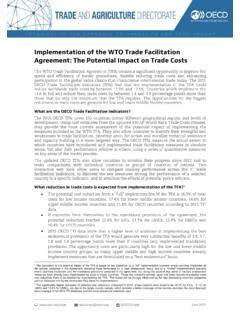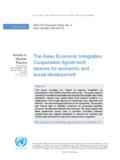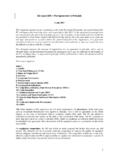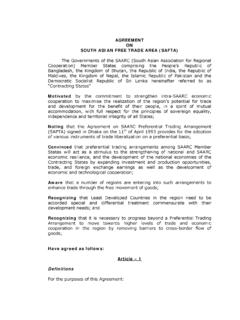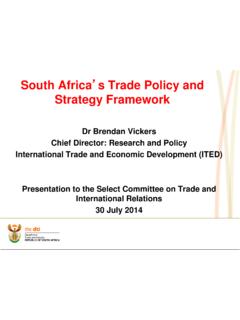Transcription of 002005 5A 1
1 OECD 2005 ORGANISATION FOR ECONOMIC CO-OPERATION AND DEVELOPMENT Policy BriefOCTOBER 2005 The Costs and Benefits of trade FacilitationIntroductionSteady increases in trade volumes and complexity in recent years have significantly changed the operating environment for the international trading community. They have also highlighted the negative impact of inefficient border procedures on governments, businesses and ultimately on the customer and the economy as a whole. Governments may face smuggling, fraud and national security problems, which drain the public coffers, while businesses pay the price of slow and unpredictable goods delivery, costly customs procedures, and even lost business opportunities. And all these costs ultimately make goods more expensive for the hidden costs of trade are so high as much as 15% of the value of the goods traded in some cases that studies show that for many countries, the welfare benefits for from more efficient customs procedures could be as high as those from reducing tariffs.
2 This is a problem for all trading nations, and finding ways to make the whole process of trading simpler and smoother trade facilitation is a key element of the Doha Development Agenda (DDA) for multilateral trade negotiations at the World trade facilitation is particularly important for developing countries, as studies show they stand to gain the most from more efficient trade procedures, although achieving it may be more challenging for these economies than for the developed world. But even modest reductions in the cost of trade transactions would have a positive impact on trade for both the developed and the developing world. This Policy Brief looks at the benefits that can be generated by trade facilitation , as well as the costs and challenges of achieving it, so as to make sure that countries can fully reap the gains of further multilateral trade liberalisation.
3 What is trade facilitation ?Why does it matter?What are the benefits of trade facilitation ?What are the costs?How is trade facilitation achieved?Why involve the WTO? For further informationFor further readingWhere to contact us?2 OECD 2005 Policy BriefTHE COSTS AND BENEFITS OF trade facilitation trade facilitation covers all the steps that can be taken to smooth and facilitate the flow of trade . The term has been used widely to cover all sorts of non-tariff barriers, including product testing and impediments to labour mobility, but in the WTO it is defined as the simplification and harmonisation of international trade procedures covering the activities, practices and formalities involved in collecting, presenting, communicating and processing data required for the movement of goods in international trade .
4 The Doha Round talks on trade facilitation cover freedom of transit, fees and formalities related to importing and exporting and transparency of trade regulations which essentially relates to border procedures such as customs and port procedures, and transport formalities. What is trade facilitation ?International trade has grown rapidly in recent years, thanks to the progressive reduction of tariffs and quotas through successive rounds of multilateral trade liberalisation. More trade means more goods crossing borders and having to comply with Customs formalities. This has often put strain on national administrations trying to cope with the increased traffic without extra resources. At the same time, businesses have become more aware of the costs involved in taking goods across borders, such as waiting time.
5 Changing business practices have also put the spotlight on speed of delivery. In an environment of just-in-time production, where car manufacturers, for example, rely on the uninterrupted reception of the necessary components, business cannot afford to have imported or exported goods tied up for long periods at the border because of unnecessary or over-complicated trade procedures and is also the question of costs inherent in the increased complexity of trade . Globalisation and international competition encourage international corporations to use a variety of locations for the manufacture and sourcing of components and final products. Preferential trade agreements have added a proliferation of complex rules of origin to the mix. In these circumstances, even methods that used to be satisfactory need to be rethought, while problems posed by inefficient methods are made worse.
6 And inefficiency in border procedures, whether too few customs officers or unnecessarily complicated paperwork, is costly, both for governments and business costs which ultimately are passed on to the taxpayer or the customer. Businesses suffer both direct border-related costs, such as expenses related to supplying information and documents to the relevant authority, and indirect costs, such as those arising from procedural delays, lost business opportunities and lack of predictability in the regulations. Surveys aimed at calculating these costs suggest that they may range from 2% to 15% of the value of traded goods. Inefficient border procedures cost governments in terms of lost revenue, smuggling and difficulties in implementing trade policy, for instance because of failure in determining the origin of products or in collecting accurate does it matter?
7 OECD 2005 3 THE COSTS AND BENEFITS OF trade facilitation Policy BriefInefficient border procedures are also likely to lead to poor export competitiveness and make the country involved less attractive to investment. But taking action to improve the efficiency of border procedures has been shown to produce results. Countries that have carried out reforms in this area have achieved a substantial increase in Customs revenue, despite the reduction in duties brought by trade liberalisation. Essentially, everyone stands to gain from making the process of trade easier. Governments gain because efficient border procedures make them able to process more goods and improve control of fraud, thus increasing government revenue. Businesses gain because if they can deliver goods more quickly to their customers they are more competitive.
8 And consumers gain because they are not paying the costs of lengthy border delays. If a truck waits at the border for a week, ultimately the customer is paying for its being off the road and unproductive during that indicate that even modest reductions in trade transaction costs, such as lengthy border procedures, translate into significantly increased trade . This is true for both rich and poor countries, but developing countries would show higher relative trade gains because of the relative inefficiency of their current systems and because agrofood and small and medium enterprise (SME) trade , which are most severely affected by inefficient procedures are central for the economy of these countries. Taking into account how trade facilitation measures to reduce transaction costs affect different sectors of the economy and different types of traders, OECD research shows that developing countries stand to gain two thirds of total world welfare benefits from trade facilitation .
9 But if trade facilitation were to be undertaken by OECD countries alone, developing countries would stand to lose. What are the benefits of trade facilitation ?Table RESULTS ON INCOME EFFECTS OF ONE PER CENT REDUCTION OF trade TRANSACTION COSTS (MILLION USD AND PER CENT OF TOTAL)Country diversityCountry and sector diversityCountry, sector and trader diversityOECD onlyWorldwide income gains due to direct cost reduction due to indirect cost reduction41 8447 68934 15542 2478 11934 12843 2598 25035 00914 0532 65011 402 OECDOECD Asia-PacificOECD EuropeOECD North AmericaNon-OECDF ormer Soviet UnionMiddle East and North AfricaLatin America and CaribbeanNon-OECD Asia-PacificSub-Saharan AfricaRest of world37%7%17%13%63%7%11%13%24%7%1%37%7%1 7%12%63%7%11%13%24%7%1%35%7%17%11%65%7%1 1%13%24%7%1%103%22%45%36%-3%-1%0%-1%-1%0 %0%Source.
10 OECD OECD 2005 Policy BriefTHE COSTS AND BENEFITS OF trade facilitation In many developing countries, clearance times for exports and imports considerably affect the competitiveness of national industry. Indian companies suffer an estimated 37% cost disadvantage in shipping clothing from Mumbai to the United States compared with Shanghai purely as a result of delays and inefficiencies in Indian ports; while Fiji holds its own against low-cost competitors because of its ability to provide quick deliveries of high-quality the benefits are so evident, why are some countries reticent to commit to trade facilitation in multilateral negotiations? One reason is that for developing countries in particular, improving an inefficient customs system may place multiple demands on limited resources.










